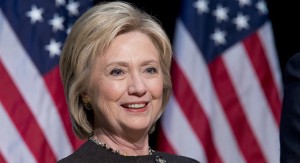The Sanders’ campaign countered Hillary Clinton’s super PAC gains, boasting that “Bernie Sanders’ raised no money last year for a super PAC.”
By KENNETH P. VOGEL 01/29/16 09:04 PM EST
Share on Facebook Share on Twitter
A constellation of three super PACs supporting Hillary Clinton’s presidential campaign raised $56.3 million in 2015, POLITICO has learned.
That includes $3.3 million raised by a super PAC called Correct the Record that, in an envelope-pushing arrangement, operates as a messaging arm of Clinton’s campaign.
Another super PAC called American Bridge 21st Century, which does opposition research on Republican candidates and their donors, raised $11.9 million, while an advertising-focused super PAC called Priorities USA Action that coordinates with American Bridge raised $41 million.
Some of the top contributions came from financier George Soros, who gave $1 million to American Bridge, Jim Simons, who gave a major donation to Priorities, and Tim Gill and Scott Miller, who gave $250,000 to Correct the Record, according to a memo from the group.
The groups are required to file reports detailing all their donors and expenses to the Federal Election Commission by midnight Sunday. But they leaked top-line summaries Friday evening in memos that boasted of unprecedented fundraising and readiness to help Clinton win a general election that’s expected to cost billions of dollars.
Republicans are “preparing a billion-dollar campaign to deceive and distort her record for months on end,” wrote Priorities USA chief strategist Guy Cecil in a memo trumpeting the group’s fundraising. “Priorities USA sees it as our responsibility to fight back early and often.”
Priorities has spent relatively little of its cash so far, though, and has $45 million on hand. In fact, liberal outside groups have reported spending only $1 million in so-called “independent expenditures” supporting the former secretary of state, compared with the $6 million spent by conservative outside groups attacking her.
To be sure, that doesn’t include the money that Correct the Record has spent working in hand-in-glove with the Clinton campaign on messaging outreach to reporters and surrogates.
Correct the Record and its founder David Brock have raised questions about the record, affiliations and even the health of Clinton’s unexpectedly strong opponent for the Democratic nomination, Vermont Sen. Bernie Sanders.
He has sought to cast Clinton as beholden to the wealthy donors who fund the super PACs devoted to her, and has boasted that he has not blessed any big-money group to support his campaign.
In a bit of gamesmanship, Sanders’ campaign released a statement a couple of hours after Cecil’s memo in which it boasted that “Bernie Sanders’ raised no money last year for a super PAC.”
Sanders “doesn’t want billionaires’ money. He doesn’t have a super PAC. He believes you can’t fix a rigged economy by taking part in the corrupt campaign finance system in which politicians take unlimited sums of money from Wall Street and other powerful special interests and then pretend it doesn’t influence them,” said spokesman Michael Briggs in the statement.
In fact, though, FEC reports show that National Nurses United for Patient Protection, the super PAC connected to the nation’s largest union of registered nurses, has spent more than $1 million on ads, rallies and other voter outreach supporting Sanders. The group is paying for a bus tour that’s been crisscrossing Iowa stumping for Sanders. It’s become such a presence on the trail that Sanders during a Sunday thanked its members “for their support in my campaign” and called National Nurses United “one of the sponsors of my campaign and I appreciate that.”

















/cdn0.vox-cdn.com/uploads/chorus_image/image/46902364/139234_39a.0.0.jpg)
/cdn0.vox-cdn.com/uploads/chorus_asset/file/3943866/138968_0739.jpg) ABC
ABC/cdn0.vox-cdn.com/uploads/chorus_asset/file/3943870/138404_5637.jpg) ABC
ABC